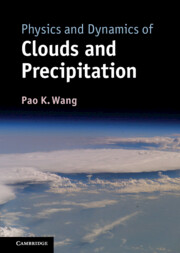Book contents
- Frontmatter
- Contents
- Preface
- 1 Observation of clouds
- 2 The shape and size of cloud and precipitation particles
- 3 Molecular structures of water substance
- 4 Bulk thermodynamic equilibrium among water vapor, liquid water, and ice
- 5 Surface thermodynamics of water substance
- 6 Aerosol in the atmosphere
- 7 Nucleation
- 8 Hydrodynamics of cloud and precipitation particles
- 9 Diffusion growth and evaporation of cloud and precipitation particles
- 10 Collision, coalescence, breakup, and melting
- 11 Cloud drop population dynamics in the warm rain process
- 12 Fundamental cloud dynamics
- 13 Numerical cloud models
- 14 Cloud electricity
- 15 Clouds–environment interaction
- References
- Index
- Plate section
6 - Aerosol in the atmosphere
Published online by Cambridge University Press: 05 March 2013
- Frontmatter
- Contents
- Preface
- 1 Observation of clouds
- 2 The shape and size of cloud and precipitation particles
- 3 Molecular structures of water substance
- 4 Bulk thermodynamic equilibrium among water vapor, liquid water, and ice
- 5 Surface thermodynamics of water substance
- 6 Aerosol in the atmosphere
- 7 Nucleation
- 8 Hydrodynamics of cloud and precipitation particles
- 9 Diffusion growth and evaporation of cloud and precipitation particles
- 10 Collision, coalescence, breakup, and melting
- 11 Cloud drop population dynamics in the warm rain process
- 12 Fundamental cloud dynamics
- 13 Numerical cloud models
- 14 Cloud electricity
- 15 Clouds–environment interaction
- References
- Index
- Plate section
Summary
Our atmosphere consists not only of gases but also of particulate matter. The particulate matter can be either liquid droplets or solid particles, which are collectively called aerosol particles. Strictly speaking, clouds are also a kind of aerosol because they are particulates too, but we will exclude them from this category in this book.
Many people have the impression that aerosol particles are merely a contamination in the atmosphere, but the scientific community sensed the important role of aerosol particles in the atmosphere early on. In 1875, the French scientist Paul Jean Coulier, when working with an expansion chamber, discovered that condensation of water vapor would not occur unless there were some dust particles in the air, and thus demonstrated the fallacy of the old “common sense” that water vapor would always condense as soon as it reaches saturation. The existence of condensation nuclei (CN) was discovered. Six years later, the Scottish scientist John Aitken independently confirmed the same thing. It is now well established that the formation of cloud droplets also needs to have these particles, and they are called cloud condensation nuclei (CCN) in this circumstance. Evidently, these particles should be viewed not just as contaminants but as an important component of the atmospheric physicochemical system.
Information
- Type
- Chapter
- Information
- Physics and Dynamics of Clouds and Precipitation , pp. 134 - 155Publisher: Cambridge University PressPrint publication year: 2013
